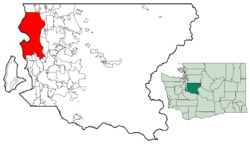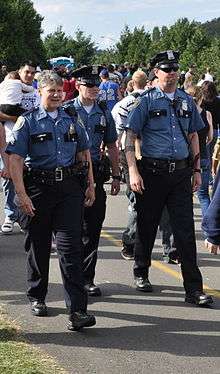Seattle Police Department
| Seattle Police Department | |
|---|---|
| Abbreviation | SPD |
|
Logo/Patch of the Seattle Police Department | |
| Motto | Service, Pride, Dedication |
| Agency overview | |
| Formed | 1886 |
| Legal personality | Governmental: Government agency |
| Jurisdictional structure | |
| Operations jurisdiction* | State of Washington, USA |
 | |
| Seattle Police jurisdiction | |
| Legal jurisdiction | City of Seattle |
| General nature | |
| Operational structure | |
| Headquarters | Seattle, Washington, United States |
| Police Officers | ca. 1,300[1] |
| Agency executive | Kathleen O'Toole, Chief of Police |
| Website | |
| Seattle Police Website | |
| Footnotes | |
| * Divisional agency: Division of the country, over which the agency has usual operational jurisdiction. | |
The Seattle Police Department (SPD) is the principal law enforcement agency of the city of Seattle, in the U.S. state of Washington, except for the campus of the University of Washington, for which responsibility falls to the University of Washington Police Department. It is nationally accredited by the Commission on Accreditation for Law Enforcement Agencies.
The Seattle Police Department has various specialty units including SWAT, bike patrol, harbor patrol, motorcycles, mounted patrols, and Special Police.[2]
Law enforcement in Seattle began with the appointment of William H. ("Uncle Joe") Surber as town marshal in 1861. The SPD was officially organized on June 2, 1869. As of 2011, it had a staff of around 1,800.[3] Since the establishment of the Seattle Police Department, 58 officers have died in the line of duty.[4]
In 2011, the Justice Department found that the department had engaged in a pattern of constitutional violations in its use of force.[5]
On May 19, 2014, Kathleen O'Toole was nominated to serve as Chief of the Seattle Police Department and was officially appointed on June 23, 2014.[6]
Command structure
The Chief of the Seattle Police Department is Kathleen O'Toole.
- OPA Director Pierce Murphy (Office of Professional Accountability—civilian position)
- Deputy Chief Clark Kimerer (Deputy Chief of Administration)
- Assistant Chief Paul McDonagh (Field Support Bureau)
- Valarie Anderson (Chief Administrative Officer—civilian position)
- Assistant Chief Mike Washburn (Deputy Chief of Staff)
- Assistant Chief Nick Metz (Patrol Operations Bureau)
- Assistant Chief Joe Kessler (Homeland Security Bureau)
- Assistant Chief Robin Clark (Special Operations Bureau)
Rank structure and insignia
| Title | Insignia |
|---|---|
| Chief of Police | |
| Deputy Chief | |
| Assistant Chief | |
| Captain | |
| Lieutenant | |
| Sergeant | |
| Detective | |
| Police Officer | |
| Source: Seattle Police Department: Policy and Procedure Manual, Title 9.050 (XI)(B), p. 7–8[7] | |
Promotions
After three years in patrol, officers can become candidates to transfer to a wide variety of specialty units and are also eligible to attend a weeklong detective school. After five years as a police officer, he or she can take a promotional examination. Every other year, civil service tests are administered for promotions. Tests are given for the rank of sergeant, lieutenant, and captain. Assistant and Deputy chiefs are appointed by the chief from the management ranks. Officers may be promoted to sergeant after five years of experience with the Department and passing the Sergeant's test. Lieutenants must have at least three years' experience as Sergeants and Captains must have at least three years' experience. A bachelor's degree may substitute for one year of experience but can only be used for one promotional exam.[8]
Significant events

On June 21, 1974, a Seattle Police helicopter on its way to a shooting collided with a Cessna near Boeing Field. Both officers on board and both civilians in the Cessna were killed.[9]
In 1987, the Seattle Police Department created the modern mountain bike patrol units, paving the way for cities across North America to follow.[10]
In 2012, the rank of "Sergeant Major" was created and bestowed upon then-Sergeant Arnold "Arny" McGinnis. Sergeant Major McGinnis started working at the Seattle Police Department in 1962, holding the rank of police officer. He retired in July 2012 at the age of 75, reaching fifty years of service to the city of Seattle. He is the only member of the SPD known to hold the rank.[11]
Misconduct
In 1999, Seattle hosted the World Trade Organization (WTO) Conference. The Seattle Police Department was criticized for failing to properly prepare for the over 100,000 protesters that disrupted the conference. While the majority of protestors were not violent, some assaulted delegates and police, and destroyed property. The protest soon devolved into a riot. In response, SPD used chemical agents and less-lethal weapons in an attempt to restore order. News footage of this response and of the rioting was broadcast worldwide. Amazingly, not a single protester or police officer was injured seriously enough during the riot to require hospitalization. Chief Norm Stamper resigned amid the scrutiny of police response to the event.[12]
In 2001, riots broke out downtown during the Mardi Gras celebrations. The riots resulted in one death, more than 70 hospitalizations, and 21 arrests. The Seattle Police Officers' Guild membership voted overwhelmingly "no confidence" in Chief Gil Kerlikowske for his failure to take appropriate leadership action during the incident.
In August 2010, SPD officer Ian Birk shot and killed Indian woodcarver John T. Williams.[13][14][15] Subsequent grand jury findings on the level of threat posed by Williams were inconclusive but an internal review of the shooting by the SPD's Firearms Review Commission found the shooting "unjustified" and cited Birk's tactical mishandling of the confrontation as being responsible for Williams' death.[16][17] Birk resigned from the department, though prosecutor Dan Satterberg declined to file charges, prompting a protest by Williams' family and supporters.[18]
In 2010, detectives from SPD's Gang Unit ordered two Latino men suspected of committing a crime to lie on the ground, where they were kicked and verbally assaulted; the incident was captured on a bystander's cellphone video.[19][20] The police let the men go soon afterwards; the video prompted protests over racial tensions and a police department internal investigation. Several officers were suspended without pay and/or demoted, but not criminally charged. A civil lawsuit by one of the two men has been filed.
In December 2011 the SPD was subject to a Department of Justice investigation that found officers had violated the 14th Amendment and the Violent Crime Control and Law Enforcement Act of 1994. The DOJ found that SPD officers engaged in a pattern of excessive use of force that violated the Constitution as well as Federal law. Furthermore, the regular invocation of the Garrity protection was found to have reduced the department's ability to supervise the use of force and hinder investigations. A spokesman for the SPD indicated they will fully comply with the DOJ inquiry to avoid a federal lawsuit.[21] In late July 2012, the city and Department of Justice reached a settlement that included improved oversight, training and reporting.[22]
On 6 October 2012, Officer Eric Faust beat a man he was attempting to detain. In September 2013, as a result of an internal investigation, the department suspended Faust for eight days without pay.[23]
On 13 July 2013, the department fired Lieutenant Donnie Lowe due to misconduct characterized as domestic violence and dishonesty.[24]
On 30 July 2013, Officer John Marion, threatened a reporter who was observing a number of policemen making an arrest. An internal investigation of Marion's behavior confirmed his actions. He was given a single day of unpaid suspension.[25][26]
In August 2013, the city agreed to pay two brothers $38,500 for a case of abuse. The two men claimed they were targeted by Officer Michael Waters because he was upset at how they had treated him at a local bar. According to the claim, Waters and his partner used the pretext of looking for two bank robbers to humiliate and assault the two men. Although the city agreed to settle the matter, neither officer was punished and they continue on the force.[27]
In January 2014, Detective David Blackmer plead guilty to stalking his mistress after she threatened to reveal their relationship to his wife. He was sentenced to 90 days in jail. An internal police investigation was then launched to determine whether he should be fired.[28]
In July 2014, Officer Cynthia Whitlatch arrested William Wingate, a black pedestrian who had a golf club that he was using as a cane. She falsely claimed that Wingate had swung his cane at her and he was charged with obstruction and harassment and spent a night in jail. When video showed he had done nothing to provoke the officer, the police department apologized in January 2015.[29] Whitlatch was later fired by Chief O'Toole.[30]
Bike Unit
The Bike Unit is credited as the first mountain bike unit in the United States.[10]
In 2005 the department started testing the use of BlackBerry PDAs with bike patrol officers. These PDAs allowed officers on the streets access to police records when the use of regular mobile data computer is not available.[31]
Seattle Metropolitan Police Museum
The Seattle Metropolitan Police Museum is a museum in the Pioneer Square neighborhood of Seattle, Washington. Founded in 1997, it is dedicated to the history of the Seattle Police Department and of law enforcement in the Seattle metropolitan area. It claims to be the largest police museum in the western United States.
In popular culture

On the American television sitcom Frasier, Frasier's father Martin Crane was a homicide detective in the Seattle Police Department. Detective Crane was forced to retire after he was shot in the hip.
Richard Dreyfuss and Emilio Estevez starred as Seattle Police detectives in the films Stakeout and its sequel Another Stakeout. The first film was actually filmed in Vancouver, British Columbia instead of Seattle while the second was filmed in Seattle.
John Wayne played a Seattle police detective in the 1974 film McQ.
In the 1987 film Harry and the Hendersons, members of the Seattle Police Department investigate various prowler incidents as well as taking plaster casts of Sasquatch footprints.
In the 1990 film Short Time, Dabney Coleman plays a Seattle police detective whose medical records are mixed up with those of a bus driver who has only a short time to live. In an effort to secure his family's financial security, he attempts to get killed in the line of duty but, in a turn of comedic events, becomes a hero cop instead. Interestingly, this film was also filmed in Vancouver, BC despite the Seattle setting.
In the film Assassins (1995) starring Sylvester Stallone, Sharon Stone, and Antonio Banderas, Seattle Police chase the assassins through the city. One of the pursuing officers was played by an actual serving Seattle police officer.
In the television series, Millennium (1996), Lance Henriksen starred as Frank Black, an ex-FBI agent that had retired to Seattle. As a consultant for the Millennium Group, he often worked with the Seattle Police Department to pursue serial killers and crack other cases of violent crimes that typically involved apocalyptic, demonic or supernatural themes. Two recurring characters, Lt. Robert Bletcher and Det. Bob Giebelhouse, were Seattle Police homicide detectives.
The 2005 film Police Beat follows an immigrant turned Seattle bicycle cop. It was written by Charles Mudede, the police beat reporter for the publication The Stranger.
In 2006, Kyle Chandler portrayed an ill-fated lieutenant in Seattle's Police Department's bomb squad in an episode of Grey's Anatomy.
In 2007, Battle in Seattle was released starring Charlize Theron and Woody Harrelson. It is a story about the World Trade Organization Ministerial Conference of 1999 protest activity. Harrelson plays a Seattle cop.
In the video game World in Conflict, the Seattle Police Department help the National Guard to fight back the Red Army's invasion of United States. Although not a playable unit, a number of SPD officers can be seen in the opening cutscene, engaging Red Army troopers and evacuating civilians.
In the television show Criminal Minds, the department along with the FBI helped solved recent kidnappings and a murder.
The AMC series The Killing stars Mireille Enos as Sarah Linden, a lead Seattle Police homicide detective. Although many exterior shots show Seattle landmarks the series is filmed in Vancouver, British Columbia.
The CBS series CSI: Crime Scene Investigation is headlined by Ted Danson and Elisabeth Shue, playing former Seattle PD Detectives D.B. Russell and Julie Finlay, both forensic specialists.
Released in 2015, the psychological suspense novel "It's Always Darkest" by author Lisa Martinez, takes place in Seattle and surrounding areas, offering two secondary characters as officers with Seattle PD's East Precinct. Seattle SWAT also has a small scene in the novel.
See also
- List of law enforcement agencies in Washington
- List of U.S. state and local law enforcement agencies
- Murder of Timothy Brenton
References
- ↑ http://www.justice.gov/crt/about/spl/documents/spd_findletter_12-16-11.pdf
- ↑ Redirect - Seattle Police Department
- ↑ "About SPD". Retrieved December 18, 2011.
- ↑ "Officer down". The Officer Down Memorial Page.
- ↑ SPD officer suspended for escalating confrontation, excessive force, by Steve Miletich, 10 September 2013, Seattle Times
- ↑ Former Boston Police Commissioner Kathleen O'Toole picked to run Seattle Police Department (SeattlePI.com article)
- ↑ "Title 9.050 – Uniforms & Equipment". Seattle Police Department: Policy and Procedure Manual (PDF). Seattle Police Department. July 22, 2011. Section XI. Insignia of Rank (B), pp.7–8. External link in
|work=(help); - ↑ West CPT Team - Seattle Police Department
- ↑ In Memoriam - Seattle Police Department
- 1 2 LEBA
- ↑ Casey McNerthney (June 27, 2012). "After nearly 50 years, Seattle cop still on patrol". Seattle Post-Intelligencer.
- ↑ Rick Anderson (January 12, 1999). "Protesters riot, police riot". Seattle Weekly. Retrieved October 19, 2016.
- ↑ Steve Miletich (October 17, 2010). John T. Williams: Dashboard Video of SPD Shooting.
- ↑ Steve Miletich (October 5, 2010). "Woodcarver was shot four times in his side by officer, autopsy shows". Seattle Times. Retrieved December 9, 2011.
- ↑ "Autopsy report (PDF) on John T. Williams' wounds" (PDF). Seattle Times. October 5, 2010. Retrieved December 9, 2011.
- ↑ Steve Miletich; Jennifer Sullivan (January 12, 20110). "Inquest jurors split over Seattle police shooting". Seattle Times. Retrieved February 16, 2011. Check date values in:
|date=(help) - ↑ Casey McNerthney (February 24, 2011). "Mayor: Sunday to be 'John T. Williams Day' in Seattle". Seattle Post-Intelligencer.
- ↑ "http://seattletimes.nwsource.com/html/localnews/2014247487_apwaseattlepoliceshooting7thld.html". Seattle Times. February 16, 2011. External link in
|title=(help) - ↑ "Seattle Cops Stomp On Detainee". kirotv.com. KIRO-TV. May 7, 2010. Retrieved December 13, 2011.
- ↑ Jonah Spangenthal-Lee (May 7, 2010). "I'm going to beat the fucking Mexican piss out of you, homey! You feel me?". PubliCola. Retrieved December 13, 2011.
- ↑ Blogger
- ↑ Kirk Johnson (28 July 2012). "Washington; Federal Settlement Is Reached With Seattle Police". New York Times.
- ↑ SPD officer suspended for escalating confrontation, excessive force; Police chief’s discipline addresses the type of issues raised by the Department of Justice when it found Seattle officers too often resort to excessive force, by Steve Miletich, 10 September 2013, Seattle Times
- ↑ PD fires high-ranking officer with troubled history; Donnie Lowe, a veteran Seattle Police officer with a troubled history, was fired on Friday, by Mike Carter, 13 July 2013, Seattle Times
- ↑ ad Cop Gets "Punished" with Day Off; SPD Says Officer's "Completely Unprofessional" Threats Against Me—Caught on Tape—Deserve a Relaxing One-Day Suspension, by Dominic Holden, 15 January 2014, The Stranger
- ↑ Hostile Policing by Dominic Holden - Seattle News - The Stranger, Seattle's Only Newspaper
- ↑ City to pay $38,500 to two brothers who accused SPD officer of vendetta, by Steve Miletich 6 August 2013, Seattle Times
- ↑ Seattle detective gets 90 days for cyberstalking, by the Associated Press, 8 January 2014, Seattle Times
- ↑ Izadi, Elahe (29 January 2015). "Video shows Seattle cop arresting elderly black man using golf club as cane". Washington Post. Retrieved 31 January 2015.
- ↑ Miletich, Steve. "Seattle police chief fires cop who arrested man carrying golf club". Seattle Times. Retrieved 16 September 2015.
- ↑ Page Not Available
External links
- Seattle Police Department
- SPD's listing at Officer Down Memorial Page.
- Seattle Metropolitan Police Museum - official site
